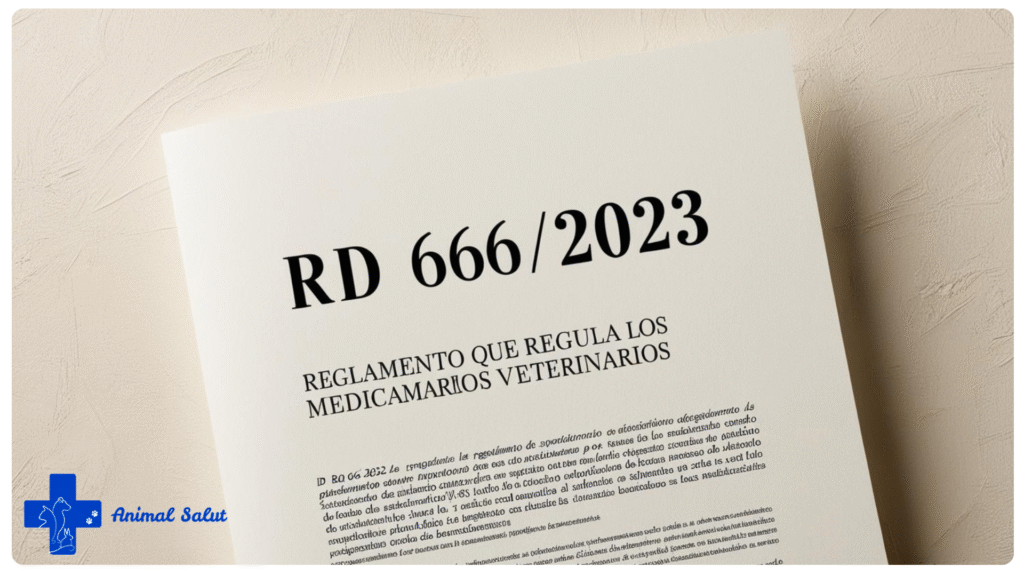
The entry into force of Royal Decree 666/2023, known as the new veterinary medicine law 2025, has significantly changed how pet owners access the treatments their animals need. At Animal Salut, both in our home visits and in our veterinary clinic in Barcelona, we experience daily how this regulation impacts both clinical care and the questions and concerns we receive from animal guardians.
In this article, we explain everything you need to know if you have a pet, with a clear, direct, and useful approach. We also share how we are applying this regulation in our daily practice at Animal Salut, through real-life examples we see in our consultations and visits.
What is the New veterinary medicine law 2025?
The regulation, based on RD 666/2023, governs the prescription, sale, and dispensing of veterinary medicines. One of its main goals is to ensure traceability and safety in the use of drugs in animals, especially antibiotics, to prevent bacterial resistance.
From 2025, all prescriptions must be registered digitally (via platforms like PRESVET or GTR), and the conditions under which a veterinarian can prescribe or provide treatment are more strictly regulated.
In practice, this means that even if your pet has previously received a treatment, you cannot purchase the same medication unless a veterinarian issues a new prescription following a current clinical examination.
What has changed for pet owners?
The main changes you’ll notice as a pet owner include:
- You need a prior veterinary examination to obtain a prescription, even if your pet has already been diagnosed and treated before.
- You cannot buy medications directly at the clinic; treatment can only be provided if a visit has taken place.
- Pharmacies are now the main dispensing channel, but many do not have the medications in stock immediately.
- The medication must be prescribed by the veterinarian who examined the animal. Another vet cannot issue the prescription if they haven’t seen your pet.
This leads to situations like this, which we often experience:
“We can only treat animals that we have clinically assessed at Animal Salut. If a pet has previously been seen by another veterinary center and needs chronic medication, we cannot dispense or issue the prescription. In that case, it is essential that the prescription is made by the vet who conducted the visit, and the medication must be purchased at a pharmacy.”
Why is this New veterinary medicine law 2025 so controversial?
One of the main points of contention is the ban on prescribing medications without a prior in-person examination. While this makes sense from a public health perspective, it complicates fast care for known or chronic cases.
Also, clients often leave the consultation with a prescription, but when they go to the pharmacy…
“Pharmacies often don’t have the veterinary medication in stock, which delays the start of treatment until the next day. Meanwhile, the animal continues to feel discomfort or pain. If prescribing a suitable human equivalent were allowed, the process would be faster and more effective for everyone.”
The law aims to reduce the indiscriminate use of antibiotics, but the reality is that owners feel it complicates access to necessary treatment. Furthermore, the veterinary sector has already reduced antibiotic use by nearly 70% in recent years, according to data from the Spanish Agency of Medicines and Health Products (AEMPS), demonstrating the profession’s commitment to responsible and evidence-based use.
What do clients think? And veterinarians?
At our center, we receive concerned, confused, or even upset pet owners daily. And we understand. Because caring for an animal is an emotional urgency.
“Many clients express frustration with us, the vets and support staff, because we are the ones who have to explain that we cannot dispense the medication without having conducted a prior examination. They often think this limitation is our decision, when in fact, we are required to follow strict regulations under the threat of severe legal and financial penalties.”
This creates an unfair situation: the vet must follow the law, but is also the one who faces the client’s frustration and the emotional weight of the animal’s suffering.
How do we manage it at Animal Salut?
At Animal Salut, we have been preparing for this law for some time. We adopted measures gradually to ensure both legal compliance and animal welfare:
“We anticipated this regulation at Animal Salut. We stopped issuing prescriptions without prior visits and avoided selling treatments without veterinary supervision. What we do is administer the necessary treatment during the visit, ensuring the animal can start the therapeutic process as soon as possible.”
Our team prioritizes direct care of the animal. Only after a veterinary assessment can we prescribe the most appropriate treatment, ensuring effectiveness, traceability, and legality.
One of the most challenging aspects of continuous care is access to pharmacies. Many veterinary medications are not immediately available, and pharmacists may not be familiar with the active ingredients or their equivalents.
“This has especially affected clients who used to come with prescriptions from other vets to purchase medication. This is no longer allowed, and they must go to a pharmacy. The problem is that pharmacists don’t always correctly identify the medication or know the equivalents. Sometimes they change the brand or even the active ingredient unknowingly, which can compromise the animal’s health.”
What solutions exist?
Even within a strict legal framework, there are ways to make the process easier as a pet guardian:
Always request a detailed report from the veterinarian who sees your pet. This is essential if you switch clinics.
Plan chronic treatments in advance to avoid emergencies.
Check if your vet offers online services or home visits, like we do at Animal Salut, to simplify the process without compromising legality.
How can Animal Salut help you?
At Animal Salut, we work to provide you with fast, legal, and pet-centered solutions:
- Home visits in Barcelona and surrounding areas.
- Own veterinary center with all necessary equipment.
- Online consultations for follow-up of chronic cases.
- Full management of electronic prescriptions, medical reports, and pharmacy communication.
Our commitment is to you and your animal. We strive to ensure you receive veterinary care that is efficient, compliant, and adapted to your needs—with minimal stress for both you and your furry companion. We follow the law, but also give you the tools to ensure it doesn’t become an unnecessary obstacle.
Conclusion
The new veterinary medicine law 2025 is deeply transforming the relationship between pet owners, veterinarians, and pharmacies. Although its goal is positive, daily reality is full of challenges.
As a pet guardian, it’s important to understand how this regulation works and how to act to avoid delays or roadblocks in your animal’s treatment.
At Animal Salut, we’re with you in this process, providing you with clear information, empathetic care, and the best attention for your pet.
Contact Us
Does your pet need treatment? Call us and we’ll help—no complications.
Book an appointment at www.animalsalut.com. We’re here to support you.
Our veterinary team is fully licensed and registered with the Official College of Veterinarians of Barcelona (COVB) and adheres to its professional guidelines.
